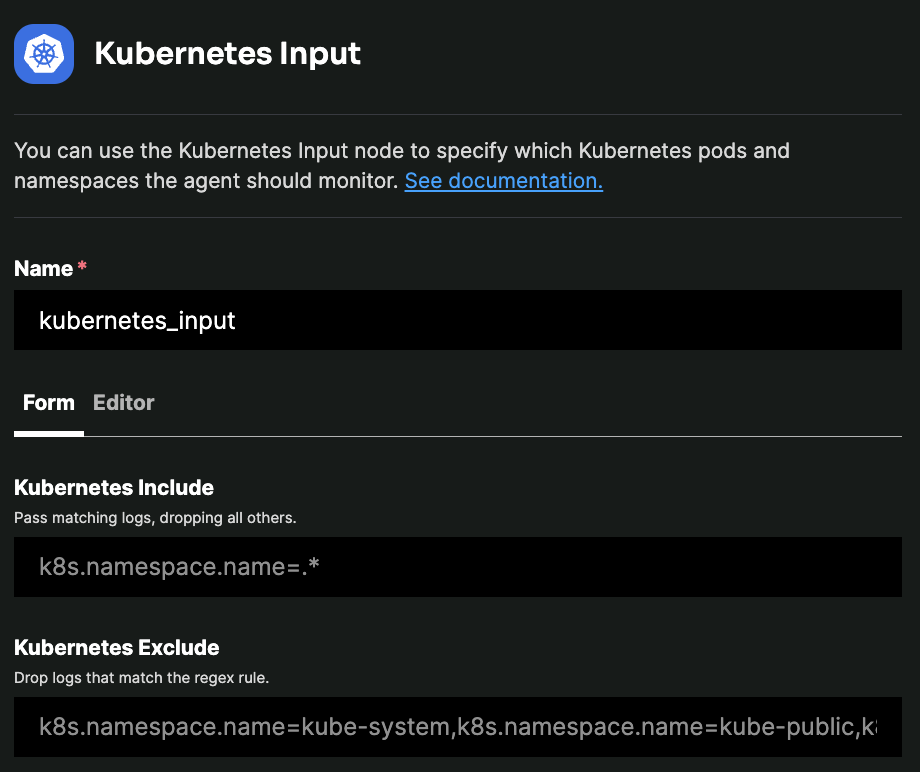Edge Delta Kubernetes Input
3 minute read
Overview
You can use the Kubernetes Input node to specify which Kubernetes pods and namespaces the agent should monitor.

Example Configuration
nodes:
- name: my_k8s_input
type: kubernetes_input
include:
- k8s.namespace.name=.*
exclude:
- k8s.namespace.name=kube-system
- k8s.namespace.name=kube-public
- k8s.namespace.name=kube-node-lease
- k8s.pod.name=edgedelta
- k8s.pod.name=prometheus
- k8s.pod.name=promtail
- k8s.pod.name=node-exporter
The
IncludeandExcludeexamples use item names from the OTEL schema. OTEL requires agent version 0.1.81 or higher. Previous agent versions used the legacy schema, for examplek8s_pod_name, which is still supported in agent versions after 0.1.81.
Controlling Ingestion Based on Object Tenancy
Each include/exclude line prefaced with a - is a complete object
reference, and each object is treated as a complete set of selection
criteria. For example, this configuration will exclude all telemetry data
from namespace nginx and all pods that start with webserver anywhere
in the cluster:
exclude:
- k8s.namespace.name=nginx
- k8s.pod.name=webserver.*
However the following configuration will only exclude telemetry data from
pods prefaced with webserver when they exist in the namespace nginx.
webserver.* pods that exist in other namespaces will not be excluded in
this example:
exclude:
- k8s.namespace.name=nginx,k8s.pod.name=webserver.*
Required Parameters
name
A descriptive name for the node. This is the name that will appear in Visual Pipelines and you can reference this node in the yaml using the name. It must be unique across all nodes. It is a yaml list element so it begins with a - and a space followed by the string. It is a required parameter for all nodes.
nodes:
- name: <node name>
type: <node type>
type: kubernetes_input
The type parameter specifies the type of node being configured. It is specified as a string from a closed list of node types. It is a required parameter.
nodes:
- name: <node name>
type: <node type>
include
The include parameter is used to specify the scope of traffic sources to be ingested. It is specified in OTEL format with Golang regex or full text. If exclude is also specified, then logs matching in include are passed unless they are dropped by exclude. Include is required.
nodes:
- name: <node name>
type: kubernetes_input
include:
- k8s.namespace.name=.*
The following values can be included in the scope for a Kubernetes input:
- k8s.pod.name
- k8s.namespace.name
- k8s.cronjob.name
- k8s.daemonset.name
- k8s.deployment.name
- k8s.job.name
- k8s.replicaset.name
- k8s.statefulset.name
- k8s.pod.labels.{labels]
- k8s.container.name
- container.image.name
For example:
k8s.namespace.name=.*k8s.namespace.name=kube-systemk8s.namespace.name=nginx,k8s.deployment.name=nginx-canary.*
You can use
k8s.{kind}.name=.+rather thank8s.controller.kind=xxx(which is no longer supported), where the values of{kind}match the Kubernetes kind, such ask8s.daemonset.name,k8s.deployment.name,k8s.job.name, etc.
Optional Parameters
exclude
The exclude parameter is used to excluded traffic from certain components from being ingested. It is specified in OTEL format with Golang regex or full text. If exclude is specified it drops logs that match its Golang regex rules. Comma separated values indicate AND rules, while separate rules indicate OR matching. In this example logs that match rule-1 and rule-2 are excluded. Logs that match rule-3 are also excluded. A log matching only rule-1 would not be excluded. Exclude is optional.
- If
includeis specified as well asexclude, then logs matching inincludeare passed unless they are dropped byexclude.
nodes:
- name: <node name>
type: kubernetes_input
include:
- k8s.namespace.name=.*
exclude:
- k8s.namespace.name=kube-system
The following values can be excluded from a Kubernetes input:
- k8s.pod.name
- k8s.namespace.name
- k8s.cronjob.name
- k8s.daemonset.name
- k8s.deployment.name
- k8s.job.name
- k8s.replicaset.name
- k8s.statefulset.name
- k8s.pod.labels.{labels]
- k8s.container.name
- container.image.name
For example:
k8s.namespace.name=.*k8s.namespace.name=kube-systemk8s.namespace.name=nginx,k8s.deployment.name=nginx-canary.*
You can use
k8s.{kind}.name=.+rather thank8s.controller.kind=xxx(which is no longer supported), where the values of{kind}match the Kubernetes kind, such ask8s.daemonset.name,k8s.deployment.name,k8s.job.name, etc.
line_pattern
The line_pattern parameter YAML only parameter specifies a Golang regex pattern that will be used as a line break rather than using a new line. It is specified with a Golang regex pattern, including a ^ for the line start, and it is optional.
nodes:
- name: <node name>
type: <node type>
line_pattern: ^\d{4}-\d{2}-\d{2}